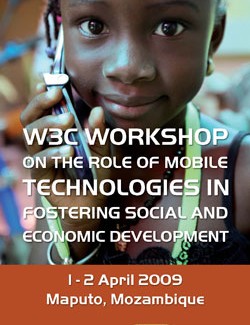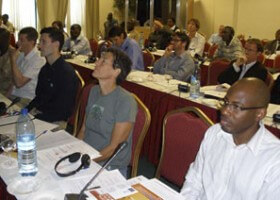
Non-profits, entrepreneurs and individuals in Africa and other under-served populations are on the verge of greater connectivity and power to address their most pressing challenges by leveraging access to the World Wide Web on mobile phones. But we have work to do to get there. This is the conclusion that I left Maputo, Mozambique with, following W3C‘s Workshop on the Africa Perspective on the Role of Mobile Technologies in Fostering Social and Economic Development. The Web Foundation is proud to have been a Gold Sponsor for the event. Here are some additional, personal impressions …
- Excellent mix of expert participants. Co-chairs Stéphane Boyera (current on the Foundation and W3C staffs) and George Sadowsky gathered the most knowledgeable, experienced and nicest people. About one third are helping people in the field in domains such as agriculture, health care, government services and education. Another third are technologists with expertise in SMS, voice, the Web. The remainder come from academia, government, etc. About half of the participants are based in Africa. The other half have strong international experience. The chemistry and conversation were remarkable.
- Agenda as a Reference Library. The agenda contains links to useful papers and presentation slides. Good statistics, tech overviews, and inspirational stories from the field, illustrating successes (most importantly, in terms of serving and empowering people), as well as challenges.
- Voice and SMS on mobiles dominate now. And there are some amazing applications addressing real problems. Four examples among tens from the workshop: Eric M.K Osiakwan described the use of SMS to support election monitoring. Josh Nesbit talked about the FrontlineSMS out-of-the-box solution, and its role in fostering more efficient and effective health care Malawi as one of many applications in a growing number of locales. Ushahidi is hardening their open source platform for SMS-based crowd sourcing in times of crisis and joy, as reported by Henry Addo (I had the pleasure of meeting Henry previously in Paris in February). Brenda Burrell described how FreedomFone’s Interactive Voice Respone system is providing critical information in Africa.
- Huge, as-yet-unrealized, opportunities for people, via the Web. In the current environment, voice and text applications have advantages. But they also come with challenges and limitations in areas such as authoring, scalability, discovery, interoperability, usability, cost and global connectivity.
Fisseha Mekuria, Sean Krepp (Nokia) and Charles McCathieNevile (Opera) presented interesting stats on the rapid expansion of mobile devices and the mobile Web and a vision for continued expansion. - Path forward. People like those at the workshop, the technologies most are currently using, and the societal problems they are working to address are all important to the expanded use of the Web for development. In fact, I think that SMS and voice, as well as browsers and widgets can be effective human interfaces to the larger Web of knowledge, including locally- and globally-relevant connect. There are also barriers to the use of the Web, including availability of affordable data services, authoring tools, literacy (language and computer), content in local languages, and basic awareness of what is possible. The Web Foundation commits to address these challenges.
- We need more events like this.“When’s the next one?” was a common question toward the end of the workshop. There is strong interest in learning more about the Web, and in seeing demonstrations and receiving training on how to author mobile-friendly Web sites (see W3C’s resource center).

The co-chairs will publish a summary of the workshop on the W3C Web site, and perhaps Steph will share his personal impressions here later.
When’s the next one? Stay tuned.